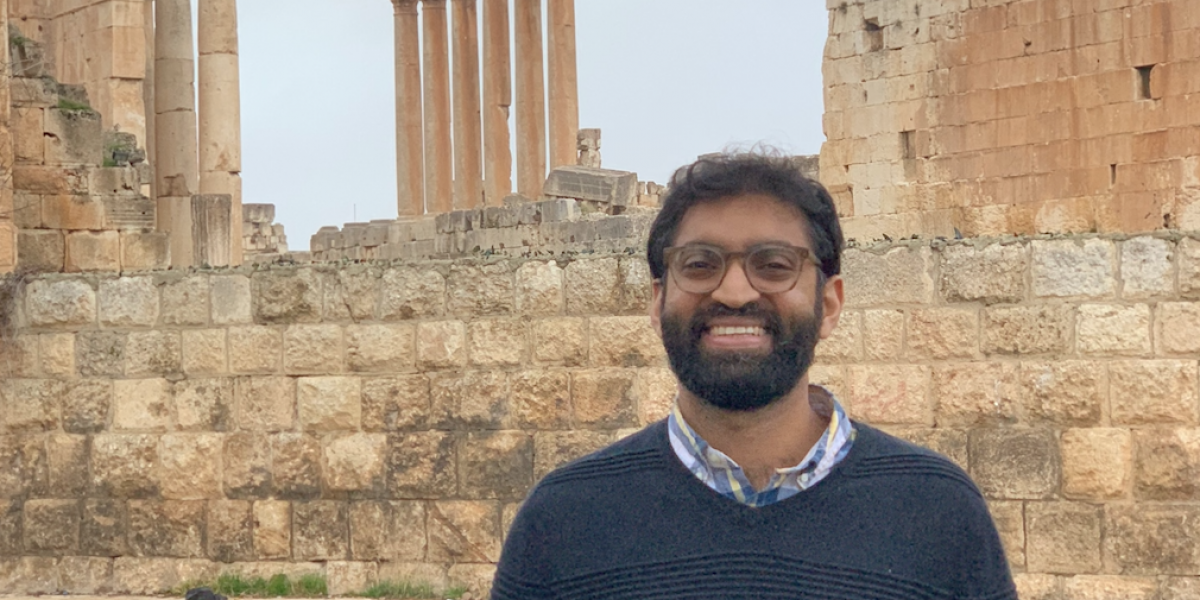Ignatian Year with Ryan Birjoo, S.J.: Love Shown More in Deeds than in Words
20 May 2021

As part of our recognition of the Ignatian Year, JRS/USA asked Ryan Birjoo, S.J., a Regent serving with JRS in Beirut as part of the Middle East and North Africa Regional Team, about his “cannon ball moment” and how he sees the life and teachings of St. Ignatius in the work he does for JRS.
What is your vocation story? What brought you to the Jesuits and to work with refugees? Do you have a “cannonball” moment?
I entered the Jesuits six years ago after spending a few years considering the possibility of religious life. The thought of being able to love and serve filled me with joy while at other times, though it was not without fear and apprehension. If I gave up everything, what kind of legacy would I leave in the world?
I suppose that my own cannonball moment came when I experienced the death of a close friend who was around my age. I was with my friend and her family when she passed, and the experience caused me to reflect on the kind of life that I wanted to live. Difficult as it was, I felt the power of a community of faith and knew that I had to engage more deeply with the invitation that God had put into my heart to explore religious life.
The Jesuits particularly appealed to me because I came across figures such as Pedro Arrupe, the one-time head of the Jesuits and founder of JRS, who connected the head and heart. When I started meeting Jesuits, I was struck by their commitment to mission and their passion to embrace reality with all is complexity. Since entering, I have gained particular appreciation for the value that Ignatian spirituality places on seeking God in all things. St. Ignatius invites us to find the God who gazes on the world with compassion, and labours for us, with us, and through us to bring us to the fullness of life.
What’s your current role with Jesuit Refugee Service?
In my current role, I work in the communications department of the JRS MENA (Middle East and North Africa). It’s a very privileged role as I can see the impactful work that JRS does in the countries of Lebanon, Syria, Iraq, and Jordan. I also witness the passion that drives our staff. For many, JRS is more than a job, it’s a place of mission where they make an active and meaningful contribution to the world through acts of service.
What drew you to work for JRS?
My work with JRS is part of my regency—a period of full time work between the study of philosophy and theology in my formation to be a Jesuit priest. My superiors missioned me to work with JRS after a period of discernment. The Middle East, and the ecclesial history here, has been an interest for many years. The plight of people forced to flee in the most recent conflicts deeply moved me. I felt the desire to of service and when the possibility to work with JRS surfaced, I felt that there was a match between my desire and the need.
Is there something from the life of St. Ignatius that you draw on in your work for JRS?
St. Ignatius always referred to himself as the “pilgrim.” This region was precious to him, and he came here to better understand the concrete reality that Jesus lived. Being a pilgrim means being open to the possibility of encounter with the other in circumstances that one does not always have control over. The people that we serve had very little choice in being on a difficult journey. Yet, in accompanying them, we learn from each other along the way and have the possibility, I believe, of seeing our shared humanity better.
For me, I saw this illustrated in one of our social centres in Lebanon where a group of Christian women overcame their initial suspicion of Muslim women to such an extent that they prepared an Iftar meal (which breaks the Ramadan daily fast) for them. Friendships were formed and difficult circumstances birthed a fruitful initiative.
How do you think the vision and spirituality of St. Ignatius continued through the work of JRS?
The vision and spirituality of St. Ignatius continues every day in JRS especially through acts of service to those on the margins. A quote often attributed to St. Ignatius is that “love is shown more in deeds than in words.” In the concrete actions of accompaniment, service, and advocacy, JRS embodies love in its projects throughout the world. The values that come from faith helps us to see that we are all sisters and brothers, and that each person has the dignity of a child of God



